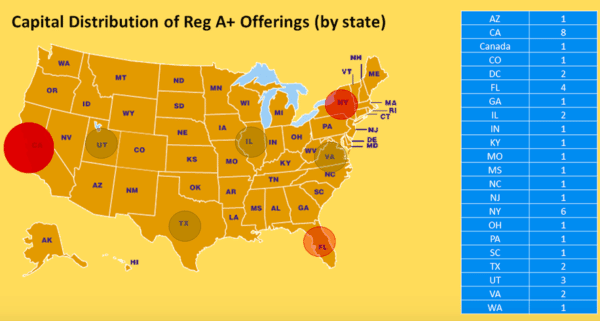
Regulation A+, which revamped the old Regulation A, became effective on June 19, 2015—just over a year ago. Here’s what we’ve seen during the past year of utilization:
Statistics: Approximately 105 publicly-filed Regulation A+ filings to date, with approximately 44 of those filings qualified by the SEC. 16 of those offerings are actively selling today. On average, it took an issuer 109 days to qualify a Reg A+ offering from the date of filing. Note, however, that this number is not precise. Many issuers are filing confidentially, so the number of filings could be significantly higher. Additionally, some issuers filed their offerings prior to the June 19 effective date but qualified after the effective date, and then amended their offerings under the new rules.
Legal costs: Legal fees averaged around $107,000 per filing, exclusive of blue sky and auditing fees. At least two issuers spent approximately $500,000 on legal fees—one with a large law firm and another with a smaller law firm. For the most part, the legal fees are about what one would expect, with national and big law firms charging in the $150,000 – $300,000 range for representation, and smaller law firms generally charging less (although there are some notable exceptions).
Utilization: The real estate industry has come out in full force to utilize Regulation A+, including Fundrise and American Homeowner Preservation. Industries lacking access to traditional financing are also turning to this regulation to raise capital—there are at least two cannabis-related companies with qualified offerings (Med-X and Weed Real Estate). Futuristic transportation companies have utilized Reg A+, including Elio Motors, that raised almost $17 million, and XTI Aircraft.
State Lawsuits: Last year, Montana and Massachusetts filed a lawsuit against the SEC over the scaling back of state regulatory authority and policy of Tier II offerings. On June 14, 2016, the DC Court of Appeals rejected their arguments, clearing away any remaining uncertainty or challenges to the new regulation.
 On the legal side, the SEC seems to be doing a good job in qualifying Reg A+ offerings in a timely fashion. Attorney Jillian Sidoti, who has been filing Reg A offerings long before it became Reg A+, commented that;
On the legal side, the SEC seems to be doing a good job in qualifying Reg A+ offerings in a timely fashion. Attorney Jillian Sidoti, who has been filing Reg A offerings long before it became Reg A+, commented that;
“The SEC has been very responsive thus far. It seems like they’re trying hard to get the process streamlined.”
The average time to qualify thus far (109 days) is a dramatic improvement over the year (or two) long process under the old Reg A rules.
However, the Reg A+ industry still has significant hurdles to overcome.
Anecdotally, some issuers have complained about the broker-dealer process, saying that their third party broker dealer’s compliance team was unable to handle (and in some cases, unable to close) the sale of securities for their offering, despite significant investor interest and pending commitments. Other issuers experience reluctance from the broker-dealer community over issuers listing on OTC Markets.
 Amy Wan, Esq., CIPP/US is a Partner with CrowdfundingLawyers.net where she practices crowdfunding law. Formerly, she was General Counsel at Patch of Land, a real estate marketplace lending platform. While there, Amy pioneered the industry’s first payment dependent note that is secured pursuant to an indenture trustee and designed to be bankruptcy remote, and advised the company on its Series A funding round. In recognition her work at Patch, she was named as a Finalist for the Corporate Counsel of the Year Award 2015 by LA Business Journal. Amy also brings extensive experience in legal innovation and rethinking the delivery of legal services. She is the founder and co-organized of Legal Hackers LA, and was named one of the one of ten women to watch in legal technology by the American Bar Association Journal in 2014. Prior to joining Patch of Land, Amy worked in enforcement and compliance at the U.S. Department of Commerce, where she represented the United States at the WTO and participated in free trade agreement negotiations on regulatory coherence and technical barriers to trade. Amy also spent time at the U.S. Department of State and U.S. Department of Transportation as a Presidential Management Fellow. She holds an LL.M. in Public International Law from the London School of Economics and Political Science, a JD from the University of Southern California Gould School of Law, and a BA in Biological Sciences from the University of Southern California.
Amy Wan, Esq., CIPP/US is a Partner with CrowdfundingLawyers.net where she practices crowdfunding law. Formerly, she was General Counsel at Patch of Land, a real estate marketplace lending platform. While there, Amy pioneered the industry’s first payment dependent note that is secured pursuant to an indenture trustee and designed to be bankruptcy remote, and advised the company on its Series A funding round. In recognition her work at Patch, she was named as a Finalist for the Corporate Counsel of the Year Award 2015 by LA Business Journal. Amy also brings extensive experience in legal innovation and rethinking the delivery of legal services. She is the founder and co-organized of Legal Hackers LA, and was named one of the one of ten women to watch in legal technology by the American Bar Association Journal in 2014. Prior to joining Patch of Land, Amy worked in enforcement and compliance at the U.S. Department of Commerce, where she represented the United States at the WTO and participated in free trade agreement negotiations on regulatory coherence and technical barriers to trade. Amy also spent time at the U.S. Department of State and U.S. Department of Transportation as a Presidential Management Fellow. She holds an LL.M. in Public International Law from the London School of Economics and Political Science, a JD from the University of Southern California Gould School of Law, and a BA in Biological Sciences from the University of Southern California.

